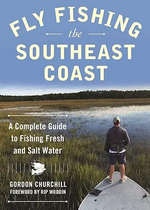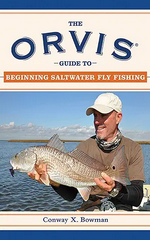Exit Strategy. Those words apply to a whole host of situations.
- When you enter a room or building for the first time, always check to find the way to get out in case of a fire or some other catastrophe.
- When driving, keep looking in front, behind, and beside you to see where you can bail out should you have a tire blowout or an accident ahead of you or some of the big logs from a log truck fall off.
- When on a boat, find out where the life preservers are or the engine kill switch or the marine radio just in case.
- And of course, leaders in a variety of areas need to have an exit strategy: for a war or a new product that fails or a new product that sells like hotcakes (success can be just as trying as failure) or….
But what about an exit strategy for life? Life is, after all, a fatal disease. As my Pappy always liked to say, Nature intends to kill us all and will succeed in the end!
Given that we are talking about fly fishing, let’s be a tad more specific. What is our exit strategy for all of the stuff we have accumulated over the decades in the pursuit of our sport? As anglers, we may be dimly aware of the old fisherman’s prayer (from back when men did most of the fishing or else I would have said old fisherperson’s prayer), Lord, help my friends keep my wife from selling my gear for what I told her I paid for it. That’s a sign of a real healthy marriage!
We have several options:
- I’ll be dead so what does it matter? Let my heirs deal with it. I’m sure they will be overjoyed.
- At the very least, you could make a fairly detailed list of what you have, where you got it, how much you paid (and when), and an honest assessment of its quality (piece of junk, cheap but good, cheap looking but superior [I’m thinking of several Scott rods with their unpainted blanks], expensive and worth every penny, you get the idea. But you’re still dumping it all in the lap(s) of your heirs.
- Of course, your family may want some of them, whether they are fly anglers or not. Your children and grandchildren and great grandchildren may like to have one or two just to have. Letting them have first crack shows your respect for them and their importance in your life. Or better yet, pick out one or two for each so this will be something you wanted them to have and ask if there are others they would like. Maybe there is one they saw you use when you caught a nice fish when they were in the boat or on the stream with you. Maybe there’s one where the wraps are their favorite color. Who knows? You can even start the process before your expiration date by telling them they are going to get two each plus any others they would like and you’ll flip a coin if two people want the same rod. They will get them when you are through with them. And when will that be, Pops? In due time, my dear.
- You could get rid of it all yourself. But then what have you got left to play with, to stimulate the memories, to have in case of that one last fishing trip. I remember the gentleman who had a modest gun collection that he sold, save for one pistol. But then he had the occasion to go turkey hunting. He had to borrow one of his shotguns back. Alas, he didn’t get to use it. Oh well. That’s why they call it hunting and not harvesting.
- You can find several young anglers with more energy than money and give them your arsenal of rods, reels, flies, gear and so forth. Of course, many people will take better care of stuff they have bought than stuff they have been given. Albert Schwitzer learned that lesson very early in his medical career in Africa. Though the actual expense of running the hospital was paid for by donations, he still found, as the story goes, that “charging” his patients a chicken or a dozen eggs or a pile of kindling was part of their treatment since it meant they would take all of the medicine he gave them instead of just enough so they started feeling better. Obviously the young anglers don’t have tons of cash lying around to pay you for your collection, But a token amount, along with the promise to pass your equipment on to someone else should they move to another sport, might be appropriate. For instance, when I was a young pastor, several older pastors gave me hundreds of the books from their libraries and I did the same thing when I retired. My boys got to go through them first, though one is a scientist and the other an artist. I was impressed by their selections. Gosh, maybe they have been listening after all. Most of the young pastors came by when I was out visiting the hospitals or nursing homes and only took a few books. One poor guy showed up while I was there. We filled up his trunk, his back seat and his front passenger seat. Sure hope he’s used them at least some.
- Another option is to give them to a charity. In this regard, since the Cape Fear Flyfishers, Inc. is a charter club of Fly Fishers International, we are under the umbrella of their 501 (C) (3) so we are a charitable institution. Give us your gear and you get a deduction. We can’t tell you how much the collection is worth that’s your job. But we can help you determine a reasonable amount. Of course, if we sell them to club members and give you the money there is no deduction. If we sell them for the benefit of the Club or even give them as door prizes, you’re safe. Perhaps, one day, there will be a high school fly fishing club in our area that could benefit from a batch of rods.
- Project Healing Waters is another charity focusing on helping injured soldiers. They and similar organizations should be able to handle all the equipment you’ve got.
- If you have something of unique interest, there may be a museum that would like to have it. Bryson City has a museum of fly fishing and there is a small museum at the Fly Fishers International office in Livingston, Montana, though they specialize in equipment by several famous anglers. But you never know.
- There are also used fly gear shops here and there. If you know of one, let us know.
The point of this is not to give you the right answer but to suggest some possibilities for your consideration. This is your equipment and you have taken great joy in collecting it, caring for it and using it.
Don’t forget to check out the resources of Fly Fishers International at www.flyfishersinternational.org.
Also, Google this and other topics of interest and go to YouTube for seemingly endless videos.



